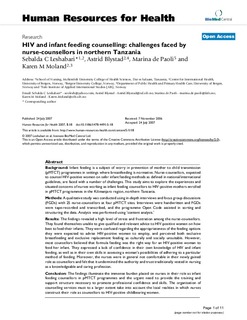| dc.contributor.author | Leshabari, Sebalda C | |
| dc.contributor.author | Blystad, Astrid | |
| dc.contributor.author | de Paoli, Marina | |
| dc.contributor.author | Moland, Karen M | |
| dc.date.accessioned | 2018-02-01T15:07:59Z | |
| dc.date.available | 2018-02-01T15:07:59Z | |
| dc.date.issued | 2007-07 | |
| dc.identifier.citation | doi:10.1186/1478-4491-5-18 | en_US |
| dc.identifier.issn | 1478-4491 | |
| dc.identifier.uri | http://hdl.handle.net/11250/2481715 | |
| dc.description.abstract | Background: Infant feeding is a subject of worry in prevention of mother to child transmission (pMTCT) programmes in settings where breastfeeding is normative. Nurse-counsellors, expected to counsel HIV-positive women on safer infant feeding methods as defined in national/international guidelines, are faced with a number of challenges. This study aims to explore the experiences and situated concerns of nurses working as infant feeding counsellors to HIV-positive mothers enrolled in pMTCT programmes in the Kilimanjaro region, northern Tanzania. Methods: A qualitative study was conducted using in-depth interviews and focus group discussions (FGDs) with 25 nurse-counsellors at four pMTCT sites. Interviews were handwritten and FGDs were tape-recorded and transcribed, and the programme Open Code assisted in sorting and structuring the data. Analysis was performed using 'content analysis.' Results: The findings revealed a high level of stress and frustration among the nurse-counsellors. They found themselves unable to give qualified and relevant advice to HIV-positive women on how best to feed their infants. They were confused regarding the appropriateness of the feeding options they were expected to advise HIV-positive women to employ, and perceived both exclusive breastfeeding and exclusive replacement feeding as culturally and socially unsuitable. However, most counsellors believed that formula feeding was the right way for an HIV-positive woman to feed her infant. They expressed a lack of confidence in their own knowledge of HIV and infant feeding, as well as in their own skills in assessing a woman's possibilities of adhering to a particular method of feeding. Moreover, the nurses were in general not comfortable in their newly gained role as counsellors and felt that it undermined the authority and trust traditionally vested in nursing as a knowledgeable and caring profession. Conclusion: The findings illuminate the immense burden placed on nurses in their role as infant feeding counsellors in pMTCT programmes and the urgent need to provide the training and support structure necessary to promote professional confidence and skills. The organisation of counselling services must to a larger extent take into account the local realities in which nurses construct their role as counsellors to HIV-positive childbearing women. | en_US |
| dc.language.iso | eng | en_US |
| dc.publisher | BioMed Central | en_US |
| dc.relation.ispartofseries | Human Resources for Health | en_US |
| dc.relation.ispartofseries | 5:18 | en_US |
| dc.subject.other | hiv | en_US |
| dc.subject.other | ernæring | en_US |
| dc.subject.other | barn | en_US |
| dc.subject.other | tanzania | en_US |
| dc.title | HIV and infant feeding counselling: challenges faced by nurse-counsellors in northern Tanzania | en_US |
| dc.type | Journal article | en_US |
| dc.type | Peer reviewed | |
